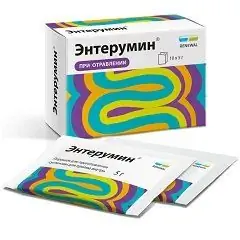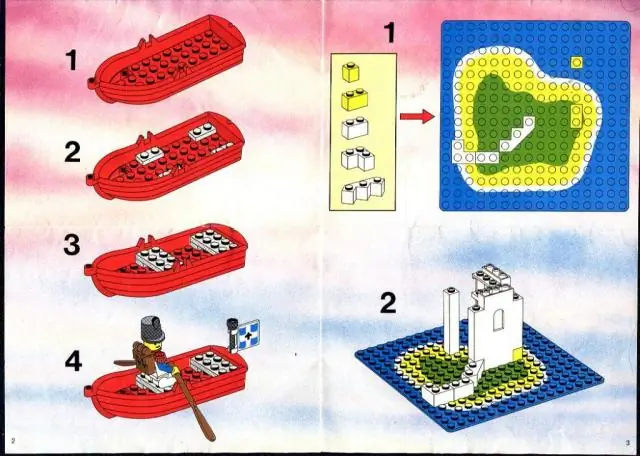- Author Rachel Wainwright wainwright@abchealthonline.com.
- Public 2023-12-15 07:39.
- Last modified 2025-11-02 20:14.
Enterumin
Enterumin: instructions for use and reviews
- 1. Release form and composition
- 2. Pharmacological properties
- 3. Indications for use
- 4. Contraindications
- 5. Method of application and dosage
- 6. Side effects
- 7. Overdose
- 8. Special instructions
- 9. Application during pregnancy and lactation
- 10. Use in childhood
- 11. In case of impaired renal function
- 12. For violations of liver function
- 13. Use in the elderly
- 14. Drug interactions
- 15. Analogs
- 16. Terms and conditions of storage
- 17. Terms of dispensing from pharmacies
- 18. Reviews
- 19. Price in pharmacies
Latin name: Enterumin
ATX code: A07BC
Active ingredient: Activated charcoal; Aluminum oxide
Producer: JSC "PFK Obnovlenie" (Russia)
Description and photo update: 2019-08-07
Prices in pharmacies: from 150 rubles.
Buy

Enterumin is an enterosorbent agent.
Release form and composition
Dosage form - powder for preparation of a suspension for oral administration: black, odorless (in a cardboard box 10 or 20 packages of 5 g each and instructions for use of Enterumin).
Active ingredient in 1 package: carbon-coated aluminum oxide - 5 or 10 g.
Pharmacological properties
Pharmacodynamics
Enterumin is a drug with enterosorbent, antidiarrheal and detoxification effects. It is characterized by high absorbent properties.
It removes microbial cells, endogenous and exogenous toxins of various origins from the gastrointestinal tract. Does not change water-electrolyte metabolism, but removes heavy metals. Does not absorb hydrogen sulfide in the intestines, which is necessary to maintain normal peristalsis.
Enterumin is most effective in diseases with intoxication with medium and high molecular weight substances.
Pharmacokinetics
The drug does not dissolve in biological media, water and alcohol. It is not absorbed from the gastrointestinal tract. Does not undergo biotransformation.
It is excreted unchanged through the intestines within 24-48 hours.
Indications for use
Enterumin is prescribed for acute poisoning and diseases accompanied by endogenous intoxication and possible diarrheal syndrome:
- intestinal infections;
- renal and / or hepatic impairment;
- hepatitis;
- metabolic disorders;
- withdrawal alcohol syndrome;
- allergic diseases;
- purulent-septic diseases;
- burn disease.
Contraindications
- bleeding from the gastrointestinal tract or suspicion of its development;
- individual hypersensitivity to the drug.
Enterumin, instructions for use: method and dosage
Enterumin powder should be taken orally 1 hour before or after meals and other medications. It is necessary to moisten the powder with water immediately before taking and drink it with a sufficient amount of liquid.
Recommended single doses:
- adults - 3-5 sachets;
- children - 1-3 sachets.
The frequency of admission is 2-3 times a day.
The daily dose of the drug is 0.3-1 g / kg: 25-75 g for adults, 10-50 g for children.
In case of acute poisoning, it is recommended to take the drug once in a dose of 100-150 g after gastric lavage.
Side effects
In some cases, constipation occurs while taking the drug. They can be eliminated by taking a laxative in a small dose, reducing the dose of Enterumin (with an increase in the duration of treatment) or following a diet.
In some cases, allergic reactions are observed.
Overdose
There is no data on overdose.
special instructions
The drug stains the stool black; this phenomenon has no clinical significance.
If the powder is stored in air, its sorption capacity decreases.
Influence on the ability to drive vehicles and complex mechanisms
Enterumin does not adversely affect the ability to concentrate and reaction speed.
Application during pregnancy and lactation
Studies to study the effectiveness and safety of the drug during its use during pregnancy and lactation have not been conducted.
Before taking the drug, you should consult with your doctor who will assess the feasibility of therapy.
Pediatric use
According to the indications, Enterumin powder can be used in pediatrics.
With impaired renal function
There are no restrictions on the use of the drug in patients with renal insufficiency.
For violations of liver function
There are no restrictions on the use of Enterumin in patients with hepatic insufficiency.
Use in the elderly
There are no restrictions on the use of an enterosorbent in elderly patients.
Drug interactions
Aluminum oxide can reduce the effectiveness of concurrently used drugs.
Analogs
Analogues of Enterumin are Karbopect, Polysorb MP, Polifan, Polyphepan, Sorbeks, Activated Carbon, Ultra-Adsorb, Filtrum-STI, Enterodes, Enterosgel, Enterumin, etc.
Terms and conditions of storage
Store at temperatures below 25 ° C in a dry place out of the reach of children, protected from light.
The shelf life is 5 years.
Terms of dispensing from pharmacies
Available without a prescription.
Reviews about Enterumin
On specialized medical sites and forums, there are no reviews about Enterumin, which would allow assessing its effectiveness and tolerance by patients.
Price for Enterumin in pharmacies
The approximate price of Enterumin for a package of 10 sachets of 5 g, depending on the pharmacy network, is 253-390 rubles.
Enterumin: prices in online pharmacies
|
Drug name Price Pharmacy |
|
Enterumin powder for suspension for oral administration 5 g 10 pcs. RUB 150 Buy |
|
Enterumin powder for suspension for internal approx. 5g 10 pcs. 265 RUB Buy |

Anna Kozlova Medical journalist About the author
Education: Rostov State Medical University, specialty "General Medicine".
Information about the drug is generalized, provided for informational purposes only and does not replace the official instructions. Self-medication is hazardous to health!






